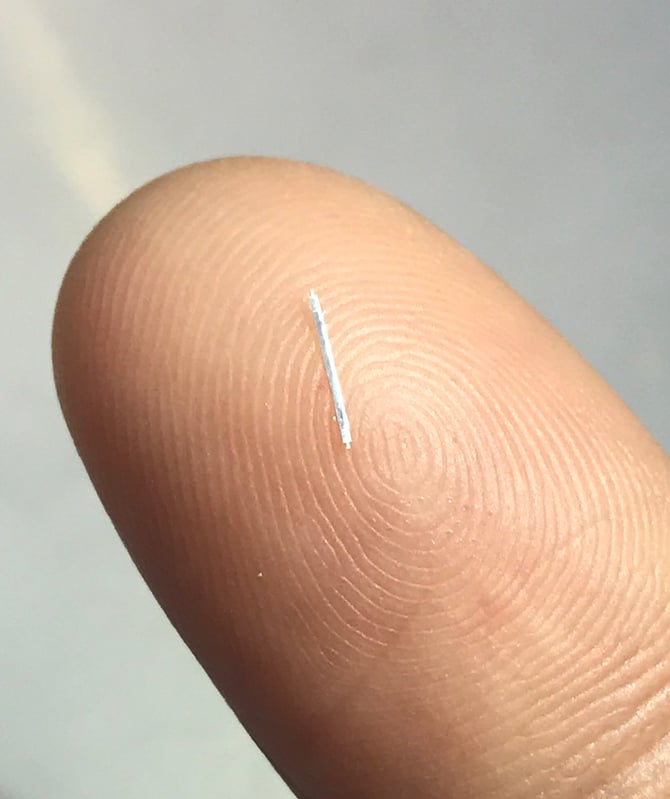
FrontEdge Technology Inc. raised $2.7 million from a couple of undisclosed investors last month to further develop a razor-thin battery for in-body medical devices.
The Baldwin Park-based company’s NanoEnergy battery also can be used in other microdevices such as smartcards. The product could be especially useful for future medical sensors embedded in the human body to measure health indicators such as blood pressure, blood sugar or cholesterol levels.
Such in-body medical devices could help doctors diagnose health problems sooner, said Simon Nieh, chief executive and co-founder of FrontEdge.
“Now you have real-time monitoring of body chemistry or health-related parameters,” he said. “That can help you assist you in monitoring diseases much better than today.”
The company’s batteries can also be recharged to 70 percent of capacity in two minutes, according to FrontEdge. The power sources can be thinner than an average human hair, and bend and twist without damage.
“If a device goes under the skin or in certain body areas that move a lot, then some flexibility becomes necessary,” said Nieh, noting that embedded medical devices need special batteries. “They all need a very, very safe small power source.”
The company’s batteries are already used in semiconductors, he said, though Nieh declined to name specific customers. Medical devices that might use the battery are still going through the Food and Drug Administration’s approval process, but could deploy the firm’s power source within about two years.
FrontEdge, launched in 1994, has about 20 employees. Its batteries are based on lithium phosphorus oxynitride technology licensed from Oak Ridge National Laboratory of Oak Ridge, Tenn.
Seed Report
The total amount of seed investment in L.A.-area tech companies jumped by roughly 44 percent in the second quarter to $74.5 million, according to Venice-based accelerator Amplify.LA.
Growth in average deal size was the main driver of the increase. The second-quarter average came in at $2.9 million compared with $1.9 million in the first. The number of transactions stayed flat at 27.
“We saw investors let off the gas last quarter and then picked up investment this quarter,” said Connor Sundberg, an analyst who helped put together the report for Amplify. “It’s hard to put a specific cause on it, but a lot of it is cyclical.”
Consumer products and services startups were the most-funded category, accounting for $26 million across eight deals. That category also received the most funding during the first quarter.
Sundberg also noted that Los Angeles hosts a growing number of seed funds, which might continue to boost the flow of seed-level investment into local companies.
“We have a lot of funds that are sitting on capital and (beginning to put) that capital to use,” he said. “It’ll be interesting to see what happens in the next couple of quarters.”
Not Just Child’s Play
Agency Catalyst Sports & Media of Santa Monica is preparing to host training camps for amateur e-sports players starting this fall.
The programs will be hosted out of a training facility for amateurs in Thousand Oaks called Sandbox Esports that launched in May. The facility resides at Sports Academy, an athletic training center for traditional sports.
The center cost a six-figure sum to construct, according to Happy Walters, Catalyst’s co-founder and chief executive.
The agency hopes the training center will become a steppingstone for young gamers as they move on to college and potentially become professional e-sports players, said Walters.
“The world is changing,” he said. “People are getting full-ride scholarships based on e-sports.”
Catalyst, which provides marketing consulting for the e-sports industry, has plans to run training camps out of the facility, including a “League of Legends” fantasy camp in September, at which participants can receive coaching from professional players. Children as young as 8 can enroll and attendance costs $3,000.
Visitors will also be able to use other equipment, including a Dynaboard, an electronic machine used to improve hand-eye coordination and reaction time, and a cryochamber to reduce muscle soreness.
Catalyst also plans to rent out the facility to pro e-sports franchises that want to use its equipment.
E-sports training facilities are beginning to pop up across the country as different organizations see the need to apply traditional sports training techniques to playing video games. WME-IMG added an e-sports training facility to its sports academy in Bradenton, Fla., last year.
Local e-sports franchises Immortals and Team Liquid are also investing around $500,000 each to build private facilities.
Staff reporter Garrett Reim can be reached at [email protected] or (323) 549-5225, ext. 232.
